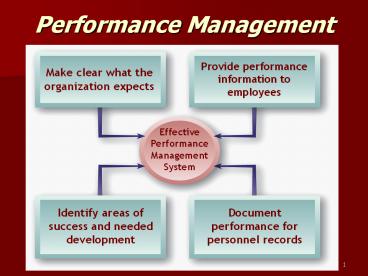Performance Management - PowerPoint PPT Presentation
1 / 36
Title:
Performance Management
Description:
Implies that lowest-ranked employees are unsatisfactory performers. ... Makes managers identify high, average, and low performers. ... – PowerPoint PPT presentation
Number of Views:78
Avg rating:3.0/5.0
Title: Performance Management
1
Performance Management
2
Performance Management Linkage
3
Performance Management versus Performance
Appraisal
4
Components of a Performance-Focused Culture
5
Identifying and Measuring Employee Performance
- Quantity of output
- Quality of output
- Timeliness of output
- Presence
- Citizenship
- Team member
6
Identifying and Measuring Employee Performance
- Job Duties
- Important elements in a job as identified from
job descriptions. - What an employer pays an employee to do.
7
Types of Performance Information
8
Relevance of Performance Criteria
- Factors
- Deficient measures
- Contaminated measures
- Overemphasized measures
9
Example ACTFL Performance Standards for Speaking
Proficiency
10
Performance Metrics in Service Businesses
Performance that is measured can be managed.
11
Conflicting Uses for Performance Appraisal
12
Decisions About the Performance Appraisal Process
- Appraisal responsibilities
- Informal vs. systematic processes
- Timing of appraisals
- Source(s) of performance information
13
Legal Concerns and Performance Appraisals
14
Typical Division of HR Responsibilities
Performance Appraisal
15
Performance Information Sources
- Supervisor ratings
- Team member/peer evaluation
- Subordinate evaluation
- Self-appraisal
- Customer feedback
- 360 Degree
16
Employee Rating of Managers
17
Team/Peer Rating
18
Performance Management Linkage
19
Category Scaling Methods
- Graphic Rating Scale
- Allows the rater to indicate an employees
performance on a continuum of job behaviors.
20
Sample Performance Appraisal Form
21
Graphic Rating Scales
- Disadvantages
- Restrictions on the range and type of rater
responses - Differences in rater interpretations of scale
item meanings and scale ranges - Rating form deficiencies limit effectiveness of
the appraisal - Poorly designed scales that encourage rater
errors
22
Sample Terms for Defining Anchors
23
More Scaling Methods
- Behaviorally Anchored Rating Scale (BARS)
- Composed of job dimensions (specific descriptions
of important job behaviors) that anchor
performance levels on the scale. - Developing a BARS
- Identify important job dimensions
- Write short statements of job behaviors
- Assign statements (anchors) to job dimensions
- Set scales for anchors
24
Behaviorally-Anchored Rating Scale Example for
Customer Service Skills
25
Comparative Methods
- Ranking
- Listing employees from highest to lowest
- Disadvantages
- Doesnt reflect size of differences between
employees - Implies that lowest-ranked employees are
unsatisfactory performers. - Laborious if the group to be ranked is large.
- Paired comparisons
26
More Comparative Methods
- Forced Distribution
- Employee performance ratings distributed along
bell-shaped curve.
27
Forced Distribution on a Bell-Shaped Curve
28
Narrative Methods
- Critical Incident
- Manager keeps written record of highly favorable
and unfavorable employee perf. - Disadvantages
- Variations in how managers define critical
incident - Time consuming and limited opportunity to observe
- Most employee actions are not observed and may
change if observed
29
Narrative Methods
- Essay
- Manager writes essay describing an employees
performance. - Disadvantages
- Depends on the managers writing skills and their
ability to express themselves. - Time consuming
- May lack opportunities to observe perf.
30
Management by Objectives (MBO)
- Management by Objectives
- Performance goals that an individual and his/her
manager agree the employee will to try to attain
within appropriate length of time. - Key MBO Ideas
- Employee involvement creates higher levels of
commitment and performance. - Employees encouraged to work effectively toward
goals. - Perf. measures should be measurable and should
define results.
31
The MBO Process
32
MBO Process
- Job Review and agreement
- Development of performance standards
- Setting of objectives
- Continuing performance discussions
33
Preparing Managers to Deliver Performance
Information
- Procedure and timing
- Performance criteria
- Rating errors
- Delivering feedback
- Compensation decisions
- Training needs assessment
34
Common Rater Errors
35
Hints for Delivering an Effective Performance
Appraisal
36
Strategic Performance Management System
- Consistent with org strategic mission
- Documents performance
- Perceived as fair
- Legal and job-related
- Developmental toolleads to performance
improvement, promotion, etc.































